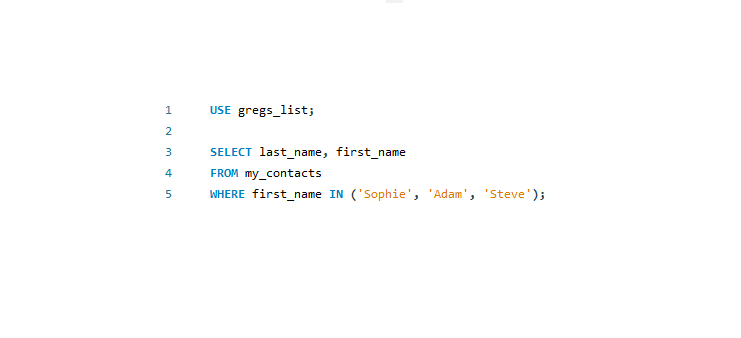Section 1: Introduction
Section 2: Setting Up a Lab Enviromment
IN Keyword:

The IN keyword in SQL is used to specify a set of values within a WHERE clause to filter your results. It acts as a shorthand for writing multiple OR conditions.
Chapter 3: DELETE and UPDATE
IN Keyword:

The IN keyword in SQL is used to specify a set of values within a WHERE clause to filter your results. It acts as a shorthand for writing multiple OR conditions.
Chapter 5: ALTER
IN Keyword:

The IN keyword in SQL is used to specify a set of values within a WHERE clause to filter your results. It acts as a shorthand for writing multiple OR conditions.
Chapter 6: advanced SELECT
IN Keyword:

The IN keyword in SQL is used to specify a set of values within a WHERE clause to filter your results. It acts as a shorthand for writing multiple OR conditions.
Chapter 7: Multi-table Database Design:
IN Keyword:

The IN keyword in SQL is used to specify a set of values within a WHERE clause to filter your results. It acts as a shorthand for writing multiple OR conditions.
Chapter 8: Joins And Multi-table Operations
IN Keyword:

The IN keyword in SQL is used to specify a set of values within a WHERE clause to filter your results. It acts as a shorthand for writing multiple OR conditions.
Chapter 9: Subqueries - Queries Within Queries
IN Keyword:

The IN keyword in SQL is used to specify a set of values within a WHERE clause to filter your results. It acts as a shorthand for writing multiple OR conditions.
Chapter 10:
If value contain apostrofe put \ backslash before it:
INSERT INTO clown_info
VALUES
('MR. Kop\'ye');
Chapter 11:
If value contain apostrofe put \ backslash before it:
INSERT INTO clown_info
VALUES
('MR. Kop\'ye');
Chapter 12:
If value contain apostrofe put \ backslash before it:
INSERT INTO clown_info
VALUES
('MR. Kop\'ye');
Romans 8:28 - And we know that in all things God works for the good of those who love him, who have been called according to his purpose.
